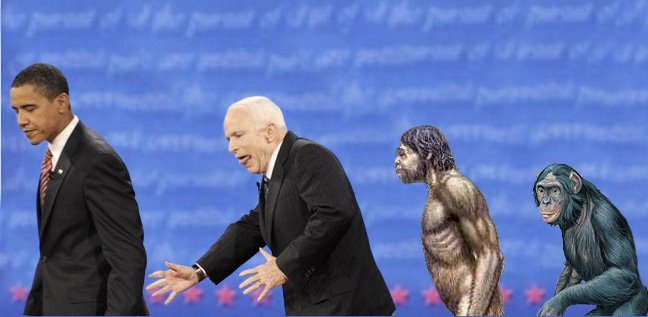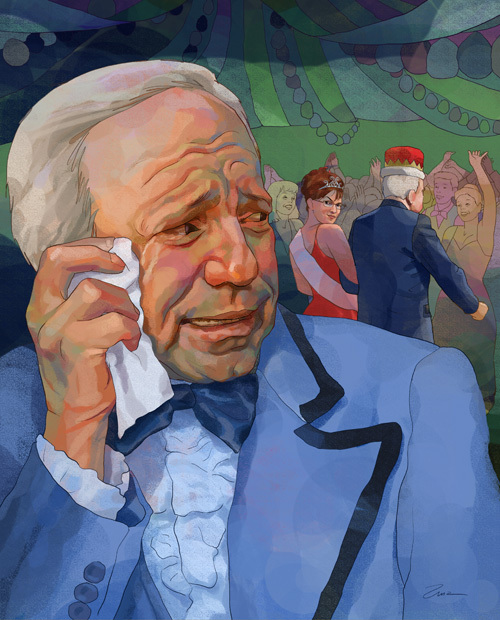From: jbc@lies.com
Subject: Yes, but why does it work?
Date: September 14, 2008 10:31:50 AM PDT
To: cathleen.decker@latimes.com
Cc: letters@latimes.com
As your article (“Why do politicians fudge the truth? Because it works”) correctly points out, politicians lie because it helps them win elections. What your article fails to do, though, is to pose, and answer, the obvious followup question: Why does it work? And how is it that a politician can do what the McCain campaign has been doing for the last week and a half (that is, lie blatantly and repeatedly, even continuing to use the same lies after they have been exposed as such) without paying a price for it in terms of public support?
In part, they can do it because of lazy, irresponsible journalism that presents a false equivalence between two things that are not equal. The premise of your piece is that both the McCain campaign and the Obama campaign are engaged in what is essentially the same sort of dishonesty. That is objectively, verifiably false. The McCain campaign is being much more dishonest than the Obama campaign. In fact, the McCain campaign is being more dishonest than any presidential campaign I’ve seen over the past 30 years. Meanwhile, the Obama campaign has been setting new standards for truthfulness. (I will grant you, given the nature of our political campaigns, that that is not a very high bar. But Obama is clearing it. Just as McCain’s tactics represent a new low.)
I don’t know why your article does such a poor job of portraying this reality. I don’t know if it is the result of incompetence and inexperience, or of a cynical decision-making process. I don’t know if you, as the reporter, were primarily to blame, or if the fault lies more with your editors. I do know this, however: As professional journalists in general, and newspaper reporters in particular, struggle to maintain their relevance in the marketplace of ideas, they can’t abandon their primary professional obligation: The accurate reporting of objective truth. Your article fails that test, and fails it badly.
John Callender
jbc@lies.com
http://www.lies.com/
Update:
From: Cathleen.Decker@latimes.com
Subject: Re: Yes, but why does it work?
Date: September 14, 2008 11:53:19 AM PDT
To: callender.john@gmail.com
The article includes 18 paragraphs on McCain misstatements, to 2 for Obama. Twice it says McCain has been more egregious. I don’t think the full story suggests an equivalence.
Thank you for reading and conversing.
Cathy
Cathleen Decker
State Politics Editor
Los Angeles Times
Cathleen. Decker@latimes. Com
—
From: callender.john@gmail.com
Subject: Re: Yes, but why does it work?
Date: September 14, 2008 12:59:50 PM PDT
To: Cathleen.Decker@latimes.com
On Sep 14, 2008, at 11:53 AM, Decker, Cathleen wrote:
> The article includes 18 paragraphs on McCain misstatements,
> to 2 for Obama. Twice it says McCain has been more egregious.
> I don’t think the full story suggests an equivalence.
Where does the article say McCain has been more egregious? I can see only one suggestion of that, not two, and the statement is made only indirectly:
‘Political innocents may wonder why a candidate like McCain, whose campaign is premised on what he calls “straight talk” — and to a lesser extent Obama — have veered from the flat truth.’
It’s not immediately clear what that “and to a lesser extent Obama” is referring to. Are you saying that Obama’s campaign has “veered from the flat truth” to a lesser extent than McCain’s? Or that Obama’s campaign is premised on “straight talk” to a lesser extent than McCain’s?
Again, as I stated in my email, this stops short of unambiguously pointing out the objective reality: McCain’s campaign is setting a record for lies, stating outright falsehoods in official campaign advertising and stump speeches, and doing so repeatedly, even after the claims have been publicly and authoritatively debunked by unaffiliated third parties. Meanwhile, Obama’s campaign is guilty of the occasional assertion that, while factually true, could be suspected of creating a misleading impression in voters’ minds. Those two things simply aren’t the same, yet they are presented as such.
Taking the article’s first 6 graphs, I definitely see a suggestion of equivalence. While it’s true that nearly all the specific examples given in the full article are of McCain falsehoods, and that this might lead a reader who is bothering to keep score to the conclusion that McCain’s sins are worse, the article does not state that objective fact — which you clearly are aware of — in clear, unambiguous terms. Why not? That point is central to what your article is _about_. To fail to state it prominently and unambiguously amounts to a lie of omission.
The Obama campaign has actually done a decent job of adhering to the high-road promises he made early on about how he would conduct himself. He has done so even in the face of some low-road campaigning from the Clinton campaign during the primary, and has continued to do so in the face of McCain’s post-convention lies. Yet you characterize the situation like this:
‘Both major party candidates for president vowed to run a different kind of campaign, implicitly promising a break from the spin-fests that past contests had become. But the close race and the tumultuous media environment in which McCain and Obama now find themselves appear to have crushed those notions.’
Yes: the campaign has crushed those notions — but only because the McCain campaign has done the exact opposite of what it promised to do, while the Obama campaign has largely remained true to its promise. To characterize that as the fault of the “close race” and the “tumultuous media environment” is to go out of your way to avoid stating the simple truth: This has happened specifically because the McCain campaign has chosen to blatantly violate the norms of presidential candidate truth-telling (such as they are).
I encourage you to think carefully about the role your own work is playing in this process. The McCain campaign would like to mislead low-information voters by making charges it knows to be untrue, counting on reporters like you to let them off the hook, as you did in today’s article. You owe your readers more than that. You owe them the truth. When you fail to give it to them (as you failed today), you let all of us down.
John Callender
jbc@lies.com
http://www.lies.com/







